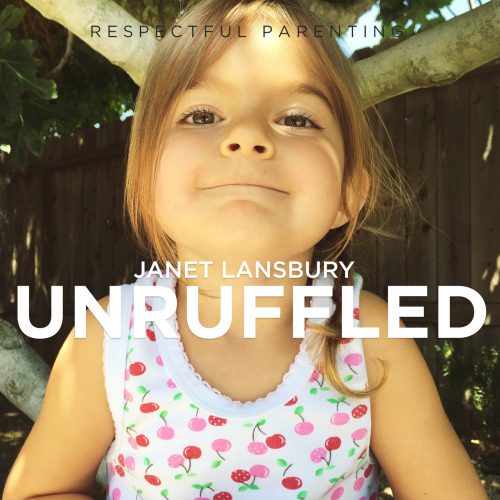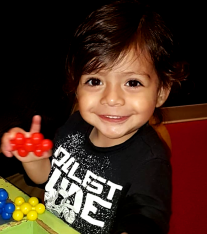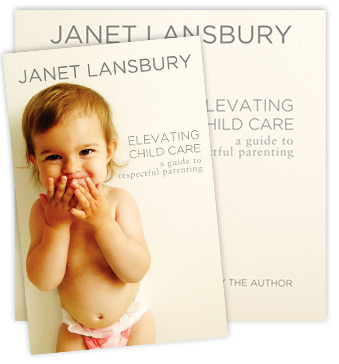Three different families write to Janet about their children’s challenging behaviors. In one case, a 2.5-year-old has resumed an old behavior of hitting and scratching, “but this time around it feels like he’s doing it with more purpose.” Another parent says that when their 5-year-old exhibits rude behavior and is called on it, he gets angry and accuses both parents of being mean to him. A third parent writes that her son loves rule breaking, often in dangerous situations, and that “his eyes light up when we say ‘no’ to things.” All of these parents have exercised patience, but the behaviors continue, and so they’ve become frustrated and find themselves getting angry. Janet reveals a common thread and suggests a solution she believes will address these behaviors.
Transcript of “When Your Child Keeps Ignoring Boundaries and Breaking Rules, Try This”
Hi, this is Janet Lansbury. Welcome to Unruffled. Today, I would like to talk about an element in our approach that can be missing sometimes when our children’s behavior seems to continue, and we’re trying to stop them. And, of course, we’re getting more and more frustrated, because most of us do when we’re repeating ourselves and it’s to no avail. There’s a certain element that’s sometimes missing, and I want to try to bring light to that today and then share about it in three different examples that I’ve been given in emails.
So I didn’t mean to be all mysterious when I was referring to an element missing when we address our children’s behavior. The element is intimacy. Giving our child that feeling that: I see you. I know you. I’m not intimidated by you, and I’m your safe person. All of those things that children need to feel. And sometimes they’re a little bit lacking in it, and that causes the behavior.
But it eases the behavior when we can give children this message. And it will make our lives easier, because we won’t be spending a lot of energy fruitlessly trying to get just the right tone in our voice and say something that will make them stop doing whatever it is. Some people punish or use consequences. Regardless, when something we’re doing isn’t working and we’re doing it and doing it, we are, naturally all of us, going to get more annoyed, frustrated, angry, and down on ourselves. Maybe we yell, and then we regret it.
So here’s another way that I want to offer that, in my experience working with parents and with my own children, really works.
So here’s the first example. Here’s the first email I want to share… Interestingly, but not surprisingly, all three of these are about children who are at some point in the process of still adjusting to the sibling transition. And those of you that listen here know that I talk a lot about the emotions that children tend to go through, no matter how old they are, when there’s a new sibling. Almost all children will express their discomfort through challenging behaviors. Challenging for us, that is.
I also want to note that all of these families are making many strides in the right direction as far as I’m concerned. So the ideas I’m talking about here are fine-tuning, nuances, just getting over the hump.
Okay, so here’s the first example. I’m just going to read snippets because they’re all quite long. And I think it’d be better for me to just kind of cut to the chase on these. So this is the first one:
I have two sons, two years three months, and 11 months. And my older guy loves rule-breaking. He’s such a sweet kid, but his eyes just light up when we say no to things. He’s the type of boy who loves to be chased and giggles when we want him to stop something as if it’s a game for him. For example, last night after dinner, he climbed up on the table and just stood there. I calmly came over to him and said, ‘Oh buddy, we don’t stand on the table. I’m going to bring you down,’ and picked him up to put him on the floor. He loved it. And immediately went back to climb up there. I said the exact same line and tried my best not to react, but he was loving it.
He started giggling and saying, ‘No, no, we don’t do that,’ while climbing back up again. And this cycle continues. Same applies in so many different situations. ‘No, we don’t walk on the road,’ makes him sprint to the road with a big smile on standing there and giggling. Then when we try to approach him, he’ll either just start laughing hard or run away. I get it. He’s a child who likes that playfulness and chase, but it’s hard when it’s a safety issue. We have a pool, and he just smiles and laughs when we say not to run toward the water and proceeds to do it.
We’ve tried giving him safe places to get out his quote, “naughtiness,” and put a dramatic flair on it, so he can recognize that this is playtime and different than other situations. Like I build a tall tower and then say, ‘No, you cannot knock this down. Stand over there and definitely do not knock it over,’ and then allow him to and laugh about it. But it doesn’t seem to do the trick. Any advice? Many, many thanks.
So I want to first look at the way this parent is seeing her child as loving rule-breaking. What is it that he is seeming to love about this, do we think? First of all, I don’t really know a child that actually loves rule-breaking in itself, but what they can get hooked into is the parent’s response. Oftentimes, when they are giggling and seem to be happy, it’s not really a deep feeling of joy and laughter that comes from the soul. It’s more of an uncomfortable giggling and: I’m still doing this again. And I don’t know why I keep going back to this. I’m not feeling connected here. I’m not feeling like she really sees me. I know I’m not supposed to do this, but here I am doing it.
So there’s more of that going on inside. It’s an out-of-control kind of feeling, even though it may appear very controlled and that he’s genuinely enjoying it. It’s very likely that he’s actually not enjoying it on a deep level. No child enjoys making their parent annoyed or upset. But they do get stuck there sometimes. Especially when they have a younger sibling. Most children will have behavior that can look unpleasant to parents at this time. And then maybe we remind ourselves, “Oh, he’s acting like this because he feels out of control. He’s scared inside. He’s hurting inside.” But we’re not going to have that at the forefront of our minds all the time.
Most of us will end up reacting negatively in a judgmental way, being annoyed by their behavior. And then the child feels that that intimacy and that acceptance of them is kind of threatened or just not as strong as they need it to be at this time.
So in a way, he’s kind of trying to join her here: Well, this is silly. This is me. Aren’t I adorable doing this stuff? But it’s having the opposite effect, naturally, because it’s very frustrating for us. And in these situations of safety, very scary for us.
I’m going to give some examples of how to respond in a way that helps him to feel that sense of intimacy. What we want to do is figuratively, and maybe in some of these cases that’ll be actually physically doing this, but figuratively drawing them into our arms. Seeing them and pulling them in close to us through our words, through our perception of the situation — because that’s going to be behind everything that we feel and do about it.
If we’re feeling annoyed, then we’re not going to be able to do this. If we’re feeling angry that he’s not listening or scared that he’s not listening, we’re not going to be able to do this. So we do have to understand, first and foremost, where it’s coming from. We don’t have to know exactly what it’s about. But when children behave these ways, it’s not about us. It’s about them. It’s coming from feelings that they’re having inside.
Just as an aside, I have a very dear friend who I consider an expert in early childhood education. And she has a child. She was just saying the other day that they were in a very stimulating day camp situation, and it was going fine while they were there. But my friend said, when her daughter came home, she wouldn’t listen. She wouldn’t do this. She wouldn’t do that. She wouldn’t cooperate.
And I said, “Yeah, she can’t.” And my friend said, “Thank you for reminding me of that. Thank you for reminding me that she can’t.”
Because it does feel like they won’t, it does feel — the way we see as reasonable adults with more emotional self-control — it does seem as if they’re just being obstinate, and they just won’t. But it’s almost always that they can’t do better than they’re doing in that moment.
She calls him a sweet kid. “His eyes just light up when we say no to things.” Well, yeah. Children feel the power in that too. When we’re saying no, there’s something really scary-powerful, uncomfortable for them about. I’m going to do it anyway. So he’s doing that. He’s getting caught up in it.
She said, “Last night after dinner, he climbed up on the table and just stood there. I calmly came over to him and said, ‘Oh, buddy, we don’t stand on the table. I’m going to bring you down.'”
What I would do or what I recommend to this parent would be more… instead of stating a rule in that manner that is not very connected… “We don’t stand on the table,” and he very clearly knows the rule… That’s why his eyes are lighting up. He’s showing you that I know you’re going to say no to this, and I’m doing it Now, what happens? Do you reject me? Or do you draw me in like I need you to do?
So the way to draw him in… I’m going to be using my words for demonstration only. You want it to be your words. But these words will help you see what I’m talking about, I think, I hope. So she starts out, “Oh buddy.” So I would say, “Oh buddy, there you go. Uh-uh (negative), come on. I’m going to take you down.”
I’m looking at him in the eyes. I know he knows I know he’s not supposed to do that. I am not afraid of him. I’m not mad at him. I’m… if anything, curious. He’s getting caught up in this. I wonder what’s going on with this little boy.
Picking him up, helping him down. “Uh-uh (negative).” And then I see him start to go over there again.
She says, “He loved it and immediately went back to climb up there.” Well, again, I don’t think he loved it, but he didn’t get the resolution that he needed right there. He got kind of a… I don’t want to say like automated response, but it wasn’t seeing him. He knows he’s not supposed to be doing this. So seeing: There you are doing it again, my little person. “I’m going to pick you up, take you down.” And then I know he’s probably going to maybe do it again.
So now my hand’s here, and I’m going to actually not let him get on the table. “Ah, ah, there you go. You’re trying to get up again. Very interesting. No, I won’t let you do that.”
And I’ve said before that I do like the phrase, “I won’t let you,” but it’s not enough to just say those words. “I won’t let you hit. I won’t let you get on the table” without the connection, meeting him where he is. I don’t know if that it feels any different the way I am expressing it, but maybe these other examples will help with that as well.
She says, “Same applies in so many different situations. No, we don’t walk on the road.”
Yeah. So I actually don’t usually recommend that phrase, “We don’t” because it does… It is a distancing way to say that, and actually to a child that can read: Well, I’m one of we, and I do walk on the road. It’s just not as effective. And it’s definitely not as connected to say it that way.
So if we are going to say something like, “Oops, I don’t want you to walk on that road. I can’t let you do that…” She said, “That makes him sprint to the road with a big smile on standing there and giggling.”
So especially when it’s about safety like this, we’ve got to be proactive. And that means, again, anticipating, knowing who this person is, this little boy who is going through certain things right now and seems to be showing certain behaviors. We’re ready for it. It doesn’t take us by surprise. So when we’re going out where there’s a road, we preemptively say, “You know what? I’m going to hold your hand.”
And then he says, “No, no.” And he tries to struggle away.
“I know you don’t like it when I do this. But I love you too much to let you go running away, my sweet.”
That level of connection. Not stating rules and expecting him to follow them. Sometimes children can do that. Oftentimes, they can’t, especially in this situation where they have a young sibling. It’s a time when they need more reassurance of the intimate connection between us. Because so much of it has changed since that baby came. It feels totally different. It feels like they’ve lost us. They need that assurance to get it back.
She says, “I get it. He’s a child who likes that playfulness and chase. But it’s hard when it’s a safety issue.” Again, I don’t think he’s really enjoying it when she’s not enjoying it. I don’t think he’s enjoying the chase at these times. He has that exhilarated, scary kind of giggle laughter.
And she says, “We have a pool. He just smiles and laughs. When we say not to run toward the water.”
So there… I mean… fences, not letting him near that area. And then, when you do have to protect him from running toward the water, just say, “Oh, could you please stop, my dear?” Or come up to him and stop him. “I’m going to stay close to you because I know sometimes you feel like running in there, and I’m going to be here for you.”
So there’s a whole other way that we can approach this that I’m recommending.
And then she said, “Giving him the safe places to get out his naughtiness.”
I think that’s just going to confuse the issue more when she’s playing out these scenarios. Because what he’s interested in is not the one that’s a game. He’s interested in the part that’s powerful with her. That’s getting people upset. That they’re noticing. Giving him that attention that he needs. But it’s not satisfying because what he really wants is more of that nurturing, safe, “seeing-him” intimacy.
So here’s another one, and this is a five-year-old:
My wife and I are writing now because we’re seeing behaviors in our son that we do not believe are acceptable for a child of his age, and we’re very frustrated as to what to do about it. One of the issues is that we seem unable to talk to him even a little bit about his behaviors without him losing control and blowing up. For example, he will speak rudely to me or my wife. Then I will say, ‘I won’t let you speak to me or your mom like that. It’s rude, please don’t.’ He will then get upset and say to me that I’m being rude to him, and he gets angry, and then it blows up.
I can say, honestly, that when I speak to him about his stuff, the first five to eight or nine times, anyway, I am speaking calmly. I’m genuinely not upset. I’m genuinely not taking it personally, et cetera.
This also happens if he does something mean to me or his mom. I’ll say calmly, ‘Please don’t,’ and he’ll get upset and say I’m being mean to him. And then things can get out of control. He turns the situation around and accuses me of doing what he is actually doing.
Unfortunately, now after a while of this, I find I lose my patients sooner than usual, but I’m also very aware of my emotions. And I think I’m speaking calmly to him, at least the first three to five times I say something to him.
So yes. Even a five-year-old and even a middle schooler and a teenager will have a big transition to sharing their parents with another child. Probably those feelings are a big part of this. The little boy is speaking rudely. The parent is saying a normal thing. “I won’t let you speak to me or your mom like that. It’s rude. Please don’t. Then he will get upset and say to me that I’m being rude to him, and he gets angry, and then it blows up.”
Right. So when children are in that space where they’re being unkind, they’re saying rude things. Again, they know they’re not supposed to do that. In their reasonable minds, they’re aware that we don’t want them to do that. So telling them that, again, doesn’t tend to be that helpful.
The way to meet this with intimacy and safety — that safety and seeing him — is to go to what is happening before that or around that.
If we know, we say, “That made you mad that we did that, or you didn’t like that that happened. We still can’t let you talk like that. But you’re saying that out of anger, it seems like.” So noticing why he’s saying the rude things.
If we don’t know why, then we want to still be curious like, “Whoa, what’s with you? You don’t sound too happy saying those things to us.”
It’s great that this parent is saying they’re not taking it personally. They’re being calm. But this is one more step that will actually help ease the behavior — that we’re reaching our arms out to him saying: I see you, this isn’t the way our child normally acts. There’s obviously something up with him or he’s in a mood.
And we accept that. Because when they say: Just don’t do that. Don’t do what you’re doing. Don’t feel what you’re feeling. Don’t say those things, it’s not only not enough to make him stop, but it gets him upset. Because what’s under those rude things that he’s saying are the feelings of being angry, being hurt, being sad, being scared.
And so he’s lashing back out as a five-year-old, saying, “No, you’re being rude.” And he gets angry, and it blows up.
So what’s happening is those feelings are now getting opened up, and they’re coming straight out. He’s not getting angry because his father said those things; he’s showing you more of the feelings behind what he said.
So we can embrace them with intimacy and safety, seeing our guy the first time when he says the things. Or, we can do it at this point now, “Oh, now you’re really angry. I think that may be why you were saying those things to us, eh? Now it feels like we’re being mean, and we’re being rude.”
And I mean behind all this is that, as adults, we mostly act out of reason and logic in our life. But children this age, especially when they’re in a big transition like this, they act more out of emotion than logic.
So when we try to address these behaviors with reason, “We don’t want you to do that. Don’t do it. Just stop,” it doesn’t work, because we’re not understanding where those behaviors are coming from. It’s like we’re sending a message out one way, and it’s completely missing the mark, because our child is sending a message from a completely different place.
And then it makes sense that we’re going to get angrier. And this is the same if he does something. We stop him as best as we can from doing it. But we notice and we see him there. “Wow. Now you’re doing all this crazy stuff. We know you don’t want to be doing that. What’s up with you?” Or, “Seems like you’re not having a happy day right now. Don’t worry. We’re always here to stop you when you get in those moods.” Something that sees him and helps him to feel close.
Here’s one more, quickly:
I’m reaching out because our two and a half year old has begun hitting and scratching. We had passed a hitting phase biting phase and others about a year ago using your methods, and it was wonderful. Recently, he has begun hitting and scratching again. But this time, it feels like he’s doing it with more purpose saying things like, ‘I’m scratching you or I’m hitting you.’ He doesn’t do it very often at home, but it’s his school program. It’s gotten pretty bad. He has started hitting the other kids in addition to the teachers, so much so that they asked us to keep our son home on Friday.
There are many factors that we think could be leading to this. His younger brother just started crawling and being active. His school just shifted to summer camp. So it’s less of a learning educational situation and more counselors moving him between activities. His class is now an almost entirely different group of kids.
And we went on a family vacation to the beach for a few days.
When he hits some scratches, we will stop his hands and say, ‘I won’t let you hit me. I’m going to stop your hands if you try to hit me again. Instead of hitting, what can you do with your hands instead?’ And an assortment of other teachings of what we can do with our hands. My wife and I are extremely patient people, but we are realizing that our words or actions may not be the best to help him express his needs properly. We would love your help so that we and the adults at a school can be most successful in helping my son direct his energy in a more positive manner.
So, in this case, I feel like what’s happening at school can be addressed at home with the parents. Sometimes it’s the pressures a child feels in that situation. And that’s definitely a part of this, for sure, that all these changes have happened. It’s a unpredictable environment at school. He’s already going through all of these transitions. It’s normal for children to act out at these times, have a lot of feelings that they can’t control.
But I think if his parents can hold space for him and give him that intimacy in their response, then that will help fortify him for the situation with the other adults that aren’t his parents and the other children. I’m not saying it can be completely ameliorated, but it will certainly help a great deal if his parents can get this part.
So the parent says, “We will stop his hands and say, ‘I won’t let you hit me. I’m going to stop your hands if you try to hit me again. Instead of hitting, what can you do with your hands instead?'”
This is, as I was just describing, a wonderful reasonable way of dealing with certain situations where that would really work.
But with a child who’s in this kind of pattern right now, needing to be seen, needing to feel safe, needing to be pulled in closer to his parents to get that safety he needs. It’s missing the mark. Again, this is all really normal, typical stuff that we all find ourselves doing, even if we have learned another way. This is still a reflexive response that parents have to see it with reason and to treat it as such.
So here, he’s doing this wonderful thing that I love. You’ve heard me talk about it here. He’s actually telling you the feeling, which is just a incredible opportunity for us to actually receive the feeling with that intimate connection. And therefore, he won’t have to do behavior.
This a two-and-a-half-year-old child doing this, and it’s just brilliant. “I’m scratching you.”
“Yes. I see you want to scratch me and I’m going to stop you.” Don’t worry, would be my subtext. Maybe I would even say it. “Don’t worry. I won’t let you hurt me, my love. I know you don’t want to be doing that. But thanks for letting me know that you’re going to scratch me. I appreciate the warning.”
Or, “I’m hitting you.”
“Yes. How does that feel trying to hit me?” Meanwhile, I’m blocking it with my hand. I’m not going to let him do it. But I want to understand those feelings. I want him to share that feeling with me of wanting to hit and wanting to scratch. And I want to give him all these reassuring messages that: I accept that. I don’t let you do it because I know you don’t want to be doing that. And you know it’s not the right thing to do. You already know that. And I’m your safe person. You can tell me anything that you’re feeling like doing or that you’re doing. I will always want to help you stop or help you avoid it. I will help you not to hurt me.
So we don’t want to expect a child can make reasonable other choices right now. All they know is, in the moment, I’m overwhelmed with this feeling that I want to do this. When they’re full of this impulse and this emotion, they don’t have the headspace to say: Hmm, what could I do instead?
And if we think about ourselves as adults, we can relate to this. We can relate to when we did those impulsive things or said that thing we didn’t mean, and someone telling us, “What are your other choices to say to me right now when you’re angry?” We can’t go there in that moment.
So maybe in a calmer time, that could be a good time to say, again, from that place of intimacy and connection: “You know when you sometimes feel like scratching or hitting? And sometimes you’re at school, and you feel like doing that? Or at camp? What do you think you could do? Tell somebody so they can stop you, maybe?”
Or sometimes people use a teether as a necklace. “If you feel like hitting, why don’t you just bite this.”
But even just that process of talking to him about it this way will ease so much of that need, because what our children feel here and in all these situations is…
Phew, It’s okay that I’ve had these urges. It’s okay that I have these feelings of doing these things I know I’m not supposed to do. They want to help me with them. They aren’t mad at me. They aren’t trying to just make those things go away. They want to see them and understand them and understand me. Phew!
Right there, we’ve eased so much of the behavior.
So I hope some of that helps.
For many more details on this topic I’ve created the No Bad Kids Master Course to give you all the tools and perspective you need to not only understand and respond effectively to your children’s behavior but also build positive, respectful, relationships with them for life! Check out all the details at nobadkidscourse.com. ♥
And both of my books are available in paperback at Amazon: No Bad Kids, Toddler Discipline Without Shame and Elevating Child Care, A Guide To Respectful Parenting. You can get them in eBook at Amazon, Apple, Google Play or barnesandnoble.com, and an audio at Audible.com. Actually, you can get a free audio copy of either book at Audible by following the link in the liner notes of this podcast.
Thank you so much for listening and all your kind support. We can do this.















Yes, block the action, acknowledge the feeling, make a connection and then address the behaviour. Kids can’t hear us until they feel understood, simply saying “I won’t let you,” can deeply upset a child. The “I won’t let you” part is really important, children need to know that we are looking after them, but without the “I understand you are hurting and I accept that,” they’ll be left thinking what they feel isn’t allowed. As a wise counsellor once said, feelings are fact…
Hi, all these recommendations are well & good, but what about when you’re in the middle of cooking dinner, & you can’t leave whatever it is, & you e hay said no to a cuddle or a play & they do these tings to get your attention, connect, so then you’re saying I should leave whatever, focus in on them, but if you didn’t have to be cooking dinner etc then you would give them the attention, I find most of you’re recommended responses for things only work when you have the time, & don’t work for everyday life when the reality is, people need to be fed, a house needs to cleaned, animals need to fed, you need to get out the door because you can’t just keep not doing things or not going to kindy etc. I wish I could be that perfect parent, but I don’t have a village, and that’s what I struggle with the most, & I feel So guilt riddled whenever I listen the the parenting expects, no one actually gives advice on how to do it & make it work when you have so much in your plate & you can’t outsource so you have more time for the kids. All
I see is how much I’m stuffing up my kids & my relationship with my kids, but I want to cook healthy meals & I want a clean house so I feel good & well we need to have clothes washed & dried etc, so what do you do when they’re acting up & you’re in a situation where you can not drop it & physically stop them, or connect with them
Etc. this would be much appreciated!
Hi Robyn — Nothing I’m advising here (or anywhere) requires you to drop everything you’re doing to give your child special attention. It seems you are misunderstanding. This advice is about the way we see and respond to children. It takes no more of our time to say, with genuine empathy… “Aye, I see you, my love, and you are trying so hard to get my attention. I know it’s hard to hear no when you want me to play!” with a moment of eye contact before going back to what we are doing. This would be instead of repeating to your child, “no, I’m busy, stop doing that.. You can’t do that. I won’t let you do that”, etc. Or some other understandable thing that we might say to try to get our child to stop. Or out of guilt, impatience, annoyance at our child for making life harder for us. They are mostly just asking to be seen and accepted as they are, while we STILL hold our boundaries. The parents in these emails have tried saying no to the behavior and it hasn’t worked. I believe that is because this element of intimacy in their relationship at these times is missing. Again, this isn’t about leaving what we’re doing! Quite the opposite. It’s about feeling even more conviction in what we’re doing while, at the same time, we welcome our child to share their feelings about that. They are safe and seen and we are safe in this disagreement.
When we respond like I’m suggesting, regularly (though we won’t be perfect), we change the atmosphere between us to one of more understanding, accepting, allowing for the feelings the child has, rather than a battle of wills, or feeling we are responsible to make our child happy every moment, which is a recipe for us to feel overwhelmed, annoyed and resentful.
In a practical sense, it helps a lot to have a safe place where your child can be while you are engaged in other things. (I recently did a podcast about “YES spaces.”) If that is not possible, we do our best to remove unsafe, inappropriate materials or place them out of reach and we work even harder to remember that our child has reasons for their feelings and their behavior is a reflection of those feelings. They really are doing the best they can in any given moment.
This was a great podcast! I can’t always relate to your podcasts because, like Robyn, I sometimes feel so overwhelmed with life that I the thought of “taking time” is incomprehensible. But it’s the consistency in trying that is important. No parent is perfect. No parent will say the “right” things all the time. Consistently acknowledging our children’s feelings and creating those safe spaces are extremely important and they will show improvement over time. I’ve also learned to let things slide sometimes in order to prioritize these teaching moments with my kids and reinforce to them that they, and especially their wellbeing and safety, are my top priority all of the time. Thank you for this post!
Janet, I loved this podcast. Our son is going through an opposite transition; his brother passed away earlier this year, something that has taken so much from each of us in very different ways. When my son acts out, it’s with us, his parents, already depleted. But having this framework of understanding that he too needs, that his, in all honesty, very small ways of acting out are means of communication, it helps me prioritize too. Your posts informed so much of the way we communicated to both of our kids about the hospital, about health, and about life this past year. It’s helped me put action to intent. I’m truly grateful.
It’s definitely an awesome podcast! I loved it. This can really help the moms who are with no clue on how to handle such cutie pies 🙂 Thank you Janet.
I keep trying to do these things, “I’m not going to let you hit me” eventually becomes “I’m going to move my body away because I don’t feel safe” and that makes it escalate 100% of the time, it’s like saying makes him go “oh yeah! Great idea!” which like, doesn’t make HIM feel safe but when he’s clawing at my face, grabbing my hoodie strings, trying to bite me, I don’t know what more to do. I tell him that I know he’s feeling scared/mad/out of control, that I’m here for him and his feelings but still worse.
Today it was getting him into his car seat and I had him half buckled so I kept trying to get him buckled up so we BOTH were safe, but every time I came back, it started physically again. How can I maintain connection without literally getting a bloody face, because that’s happened.
(Not eventually, immediately. The first time we say it.
Your comment about kids not being able to listen after a long day at camp was THE reminder I needed. Our 5 and 6.5 year old come home exhausted but happy. They struggle mightily with simple tasks (like brushing teeth), requests (like please put your shoes away), or basic behavioral norms (around eating, physical aggression, or literally anything that is on the rails when they aren’t so tired or overstimulated). I’m searching for what to do in these scenarios when they are maxed out and we have hours to go before bedtime. Do you have a link for another podcast or article about that? Thank you!!!
I get the “I won’t let you do this,” and even using physical restraint, in theory, bug when I became pregnant with our second and since she’s arrived, I have often found myself physically unable to stop my 3yo, and she will run for the road or behind counters (today she ran behind the counter at a gas station and started knocking over their liquor bottles, meanwhile I’m holding an infant and trying to put my wallet away. ) How do you handle those situations? I feel like I can’t go anywhere without a second adult because she will take off and duck under things, and I can’t get to her with a baby tied to me or in my arms.
I have 3 kids..14 years boy, 10 years boy and a girl which is 2 years old. My both son are breaking rules of our house, I am always yelling on them but they never listen to me.. my daughter become very cranky all the time.. I cannot manage my kids..they have age difference also.. I am very frustrated..what should I do??